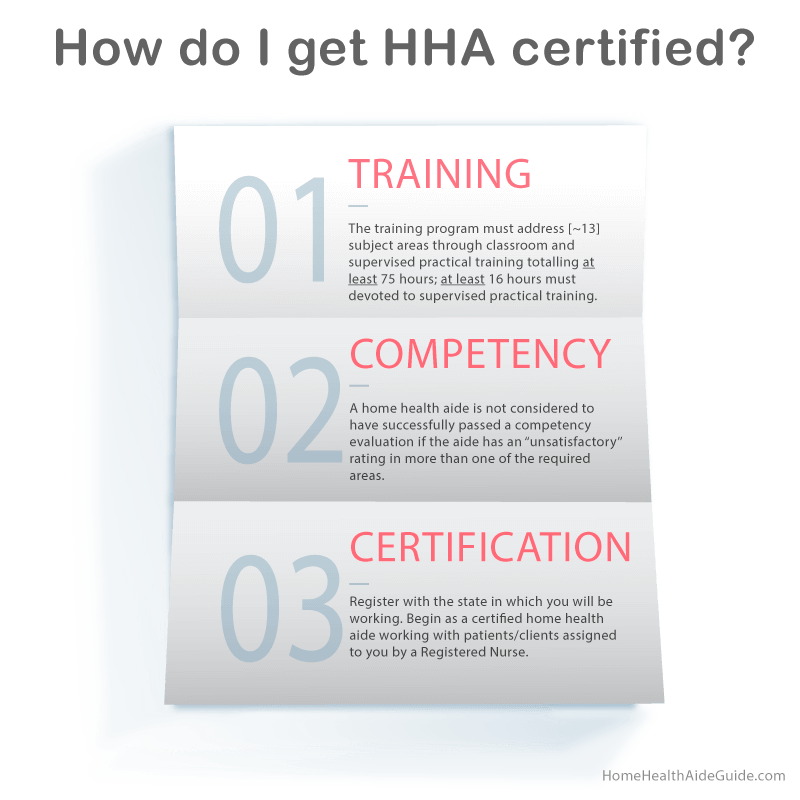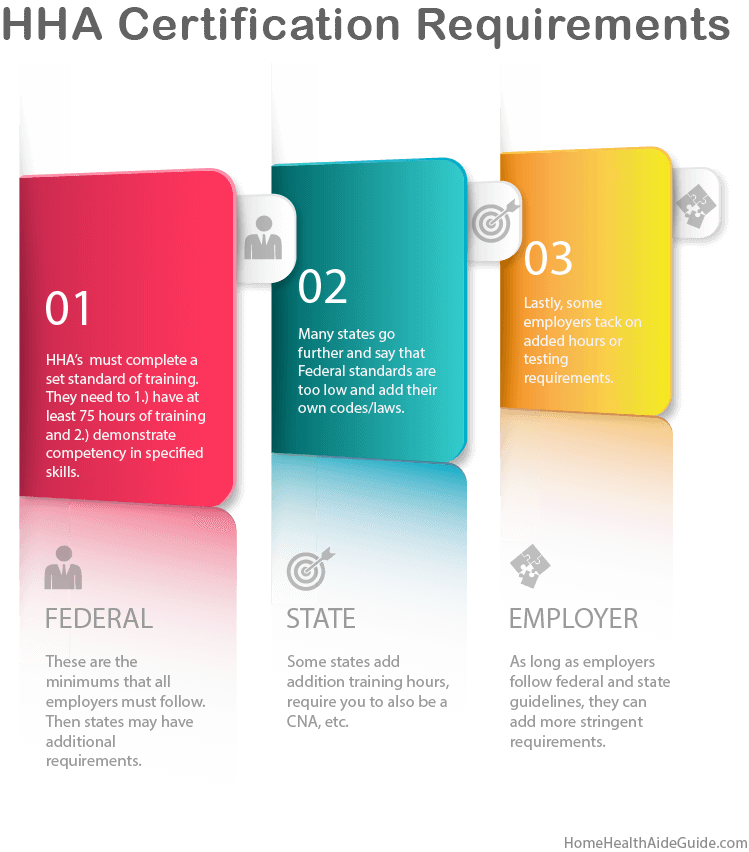Get certified as a HHA in weeks – without any prior experience!

Becoming a Home Health Aide (HHA) could be the swift career shift you’re seeking. Our guide simplifies the certification process, detailing the necessary training and competency tests required to secure your role in this vital healthcare field.
Whether you’re exploring federal or state-specific requirements, our insights will prepare you for a successful start in home health services
Here’s the number 1 question people ask who want to become a home health aide (HHA):
“How To Get HHA Certified?”
Being “Certified” means that you have demonstrated you have the credentials or requirements to be a home health aide according to federal (i.e. the United States) and state codes.
Here’s an easy to follow answer to getting your HHA certification.
You get HHA certified when you complete specified training and can successfully prove/demonstrate that you’re competent/qualified in these skills.
Sounds simple enough, right?

But those are federal rules for certification – this may vary by state and even individual employer.
For example, one state may have you pass a competency exam before you get Certified and the next state over says that you merely need to pass a training program from a home health agency.

That’s where the confusion comes in: there are no definitive rules and laws that cover every state and every employer to attain your certificate.
While there is no possible way to break it down for every employer in every state, I will tell you the state requirements.
And don’t get overwhelmed – you’ll only be working on one state, so you just need to focus on that state. No need to learn about the other states!
To further ease any fears you may have, your potential employer (e.g. assisted living facility, home health agency, nursing home, etc.) will know exactly what you need to do to be successful in your new healthcare career. They have all the details and will not steer you wrong – they want you up and working quickly.
Let’s start from the very beginning.
Every state must follow these the minimum guidelines:
Home health aides working for employers who receive Medicare compensation must complete a set standard of training.
They need to 1.) have at least 75 hours of training and 2.) demonstrate competency in specified skills.
Form there, states and/or employers may add other obligations.
That’s two (2) parts: Training and Competency

Step #1 – Training
Federal HHA Training Requirements
Every state must adhere to at least this training:
At least 75 hours of training, including at least 16 hours of supervised practical or clinical training and 12 hours of continuing education per 12-month period.
Certified Home Health Aide Online? That’s good enough, too, so don’t rule that out.

The aide training program must address [~ 13] subject areas through classroom and supervised practical training totaling at least 75 hours, with at least 16 hours devoted to supervised practical training.[br] [br]The individual being trained must complete at least 16 hours of classroom training before beginning the supervised practical training.
State HHA Training Requirements
A handful of states mandate that you must also be a certified nursing assistant (CNA); yet others increase the training from 75 hours to 120 hours and even 160 hours.
Certified home health aide classes will vary in structure though all must “behave” according to the rules.
(If you are a SNAP participant, also known as food stamps, then you can get free HHA training in your state – it’s the law!)
Step #2 – HHA Competency
The last part “demonstrate competency in specified skills” is what we’ll focus on next.
How do you demonstrate your competency to home health certified?
Federal HHA Test
The US government merely states that you must be “evaluated” and not be ‘‘unsatisfactory’’.
I know what you’re thinking… it says nothing about a competency test.

A home health aide is not considered competent in any task for which he or she is evaluated as ‘‘unsatisfactory’’. The aide must not perform that task without direct supervision by a licensed nurse until after he or she receives training in the task for which he or she was evaluated as ‘‘unsatisfactory’’ and passes a subsequent evaluation with ‘‘satisfactory’’. [br]A home health aide is not considered to have successfully passed a competency evaluation if the aide has an ‘‘unsatisfactory’’ rating in more than one of the required areas.
Not very helpful at all, right?
State HHA Test
Each state must pick up the slack from the lack of clarity from the federal guidelines.
States make it a little bit clearer on how to demonstrate competency. Yet others simply refer you to the federal rules.
Competency does not always mean taking and passing a test; you can be evaluated during your training and be competent.
That’s why I said earlier here that: “there are no definitive rules and laws that cover every state and every employer to attain your certificate.”
Let’s break down the requirements by state so you can follow exactly how to be certified.
This way you can see exactly the home health aide training and what testing (if any) is necessary.
| State | Training | CNA Requirement? | Competency Test? | Other |
|---|---|---|---|---|
| Alabama |  |  |  | |
| Alaska |  |  |  | |
| Arizona |  |  |  | |
| Arkansas |  |  |  | |
| California |  |  |  | |
| Colorado |  |  |  | |
| Connecticut |  |  |  | |
| Delaware |  |  |  | |
| District of Columbia |  |  |  | |
| Florida |  |  |  | |
| Georgia |  |  |  | |
| Hawaii |  |  |  | |
| Idaho |  |  |  | |
| Illinois |  |  |  | |
| Indiana |  |  |  | |
| Iowa |  |  |  | |
| Kansas |  |  |  | |
| Kentucky |  |  |  | State Registered Nurse Aide (SRNA) |
| Louisiana |  |  |  | |
| Maine |  |  |  | |
| Maryland |  |  |  | |
| Massachusetts |  |  |  | |
| Michigan |  |  |  | Homemaker-Home Health Aides |
| Minnesota |  |  |  | |
| Mississippi |  |  |  | |
| Missouri |  |  |  | |
| Montana |  |  |  | |
| Nebraska |  |  |  | |
| Nevada |  |  |  | |
| New Hampshire |  |  |  | Licensed Nursing Assistants (LNA) |
| New Jersey |  |  |  | |
| New Mexico |  |  |  | |
| New York |  |  |  | |
| North Carolina |  |  |  | |
| North Dakota |  |  |  | |
| Ohio |  |  |  | |
| Oklahoma |  |  |  | |
| Oregon |  |  |  | |
| Pennsylvania |  |  |  | |
| Rhode Island |  |  |  | |
| South Carolina |  |  |  | |
| South Dakota |  |  |  | |
| Tennessee |  |  |  | |
| Texas |  |  |  | |
| Utah |  |  |  | |
| Vermont |  |  |  | Licensed Nursing Assistants (LNA) |
| Virginia |  |  |  | |
| Washington |  |  |  | |
| West Virginia |  |  |  | |
| Wisconsin |  |  |  | |
| Wyoming |  |  |  |
This chart does not incorporate what employers may ask of you; some may have more stringent goals in an effort to distinguish themselves from other home health agencies, assisted living facilities or nursing homes.
Why Get Certified

Getting your certification is important for two key reasons:

First, it is an indicator of the training you have received. Not only have you participated in training, but you passed a certification exam proving the depth and breadth of knowledge after the training.
Certification is also an indicator of ongoing qualification. To maintain certification, a home health aide must take continuing education courses, according to Federal law.

Second, it’s required for services that qualify for Medicare payments.
It is a law for all Medicare certified home health agencies to hire certified home health aides for services that qualify for Medicare payments.

Most agencies can only hire and employ home health aides who are certified. Yes, you need to be certified.
If you want to work at a “certified home health agency” you will need to pursue your home health aide certificate.
You will have more opportunities for employment and earn more as a certified aide.
A home health aide certificate can give you a leg up on the competition and can also factor into potential promotion opportunities down the road.
It can only help boost your potential for getting better and higher paying jobs!
Non-Certified Home Health Aides
Non-certified home health aides are not required to be certified because their level of care is restricted to things that an ordinary person could effectively and efficiently accomplish without medical training.
Non-certified aides can provide services such as light housekeeping, meal preparation and companionship; Direct medical care is not allowed by these types of caregivers, so certification is not necessary. Visit this link to learn more about the types of skilled and non-skilled home health caregivers.
Further, non-certified home aides cannot be employed by a Medicare-certified home health agency.
And most agencies provide services to patients who are covered under Medicare; by this fact alone you may be limiting your opportunities to work as a home health aide.
You may also be limiting your career advancement and how much you can earn for a living.
[See also How I Overcame My Fears and Became A Home Health Aide.]How To Get Free HHA Training Near You
Your home health aide certification cost should be nothing, or a very low cost.
Even better?
How about free home health aide certification?

And it’s actually right under your nose.
The very best way to get free home health aide training: contact home health aide agencies.

